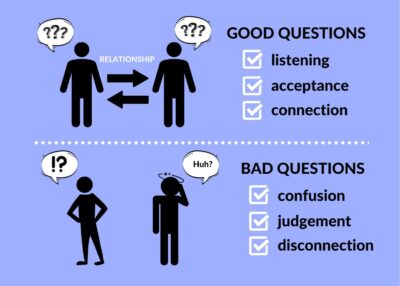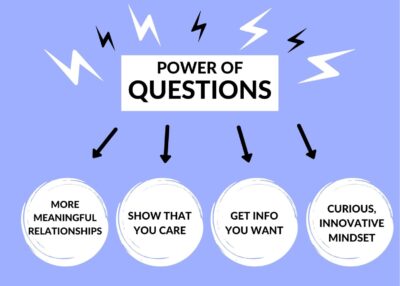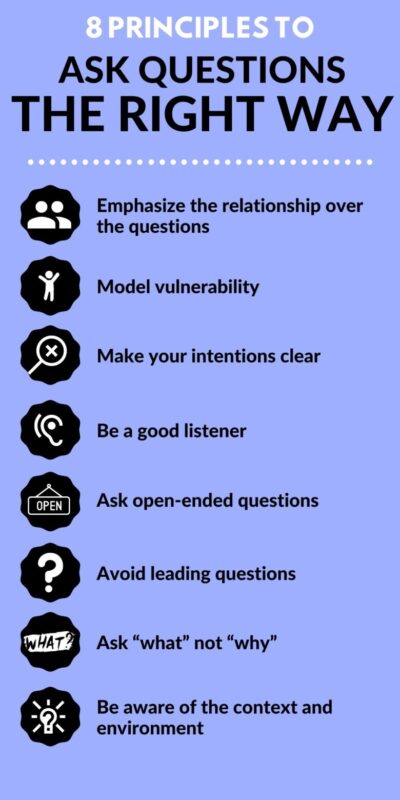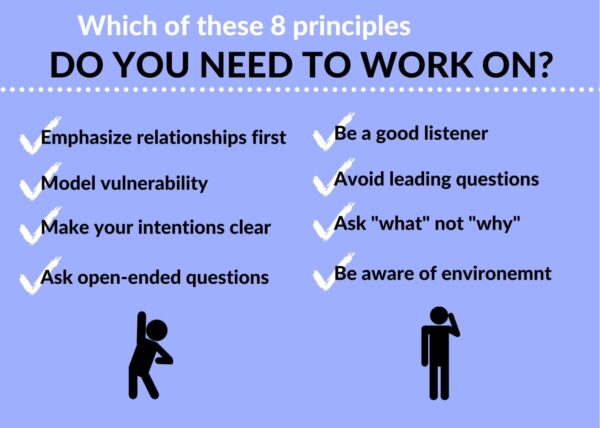Learning how to ask the right questions (and ask questions in the right way) will benefit you, your work, and your relationships.
Curiosity is one of the most important qualities you can possess if you want to lead successful, meaningful lives. Being curious is not always our default, however. It’s a craft that you must practice.
To live the best, curious life you can, you must begin by learning how to ask the right questions.
Some studies show that children ask as many as 300 questions a day. As they work to make sense of their world, they understand that curiosity will help them broaden their world. Questions will lead to answers, which will lead to more questions, and so on. Undaunted by social hierarchies and anxieties, they forge forward in their relationships with beautiful, rich questions.
Unfortunately, we lose our desire to ask so many questions as we get older. We also lose our ability to ask the right questions.
.
The Importance of Curiosity and Asking the Right Questions
Asking questions helps us develop our own self-awareness, as well as a deeper understanding of others. Humans are social creatures, and we rely on relationships to feel meaningful and fulfilled. The relationships, however, cannot be one-sided. Instead, understanding, acceptance, and a sense of belonging should serve as the foundation.
We rely on communication to establish these connections. Unfortunately, our communication skills are not always up to snuff. Many of us lack the Emotional Intelligence we need to establish healthy connections. We think we’re asking the right questions, but instead, we’re not listening, not getting the information we want, and – most notably – not inviting unity to the conversation.
When we learn how to ask the right questions, we open ourselves to more possibilities and connections.
.
The Power of Asking the Right Questions (and the Benefits of How to Ask Questions the Right Way)
Questions contain a lot of power. Some of the benefits of learning how to ask the right questions include:
- You will form closer, more meaningful relationships.
It’s no surprise that good questions can help you get to know someone on a deeper level. People must feel accepted for who they are to feel connected. When we ask the right questions and really listen to the answers, we can show others that we accept them for who they are. This exchange will promote trust, empathy, and understanding in the relationship.
- You can show others that you care.
Asking questions can be an excellent demonstration of care – if done the right way. When we ask questions, we’re essentially saying, “I want to learn more about you because I’m interested in your life.” After all, if we didn’t care, we wouldn’t ask the questions in the first place. Asking the right questions can serve as check-ins, follow-ups, or a genuine concern for another person.
- You can obtain the information you want.
Not all conversations have to be deeply personal; in fact, the majority of them aren’t. We frequently communicate because we’re seeking specific information. Yet, far too often, we find ourselves without the answers that we wanted. When you learn how to ask the right questions, you can be more effective in your communication and collection of information.
- You will develop a curious, innovative mindset.
Nobody wants to stop learning and growing at a certain age. Still, many of us dial down our curiosity and come to accept things for what they are. Change never comes from complacency. Innovation relies on our ability to ask the right questions, whether we’re questioning ourselves, other people, or the idea sitting right in front of us.
Once you value the importance of asking questions, you must learn how to do it in the best way. Fortunately for you, it’s a skill that you can learn.
Ready to learn how to ask questions in the right way?
.
Principles for How to Ask Questions in the Right Way
1. Emphasize the relationship over the questions
It might seem surprising that the first principle for how to ask the right questions tells you to not focus on the questions. Nevertheless, this principle might be the most crucial one. Everyone wants to feel valued and comfortable in conversation. If someone feels used or misguided, they’ll be quick to put up walls and hold back what they have to offer.
If you want to ask questions correctly, your focus should first be on the relationship. More importantly, the other person needs to feel this emphasis.
Show your listener that you are invested in them as a person. The better you know them, the more specific you should be in your references to their role in the conversation (and, depending on the circumstance, their role in your life). Even if you just met them, you can still express appreciation or gratitude for them talking to you in the first place.
Most importantly, do not perform these actions under the “guise of connection.” People will see through your tactics. Take a moment to genuinely appreciate the person and the relationship.
.
2. Model vulnerability
One of the reasons it’s so crucial to emphasize the relationship is because it’s hard to be vulnerable. Shame, fear, and societal messages make it challenging for us to be open and authentic in our answers.
Before you get to asking the right questions, you must model the vulnerability you’d like the other person to show. This modeling does not mean a “tell-all,” nor does it mean that you supply a bit of information as a bargaining chip for the other person. Instead, modeling vulnerability merely means your willingness to be open and transparent.
The expression of this vulnerability will change depending on the situation. If you’re on a first date, you might need to summon the courage to share something important to you. Conversely, suppose you’re talking to a coworker. In that case, you might model vulnerability through sharing your worries and genuine perspective on the project at hand.
Studies have proven that we view another person’s act of vulnerability more favorably than we do our own. Asking the right questions is about being the first to say, “I’m putting my trust in you and hope you can do the same.”
.
3. Make your intentions clear.
In line with a focus on relationships and vulnerability, you also should make your intentions clear. Why are you asking the person these questions? What information are you hoping to walk away with?
When you’re transparent with your intentions, you establish trust in the conversation. Furthermore, you create clarity about your end objective. Being on the same page will prevent the miscommunications that many of us experience daily.
This clarifying step should come before and during your conversation. Before you even get to asking questions in the right way, you want to make sure all parties are informed about what is happening.
And this intention-setting doesn’t have to be overly formal. Depending on the situation, it might merely mean opening with, “I’m hoping to learn more about X because of Y.” This simple statement immediately orients the conversation in the right direction.
.
4. Be a good listener
While this principle for how to ask the right questions might seem obvious, it shouldn’t. The majority of us are poor listeners. Studies show that our brains only use about 25% of their capacity to listen. More often than not, the other 75% wanders – leaving us to retain less than a quarter of what we hear.
Furthermore, we can recognize when people are listening to us or not. I’m sure you’ve all had experiences when you can tell the other person isn’t listening to you. (Hello fiancé, remember me, talking to you over here?) When we feel someone is listening intently, we’ll be more likely to keep talking.
Fortunately, becoming a good listener is something you can practice. You can also demonstrate your listening skills by giving verbal affirmatives in a conversation. This affirmation might include voicing agreement, asking follow-up questions, or restating what the person said back to them. All of these tiny actions demonstrate that you want to know more. They help you ask questions in the right way.
.
5. Ask open-ended questions
This principle in how to ask questions the right way probably doesn’t need much explanation. Still, it’s worth repeating for the sake of importance. When we ask open-ended questions, we allow room for further explanation and exploration. We clearly show that we want an answer.
Avoid asking yes or no questions or any questions that prompt a concise answer. Unless you’re in a time crunch, you’ll most likely get the information you’re looking for without a super specific question. By asking an open-ended question, you increase your chances of gaining more valuable knowledge that you didn’t know you didn’t know. (How’s that for a mind puzzle?)
Additionally, open-ended questions give power to the other person. By opening up the conversation floor, you allow the other person to take the lead in where they want to go. Not only does this create more trust, but it also will keep you in a listener mindset.
.
6. Avoid leading questions
If it’s crucial to ask open-ended questions, it’s just as vital to avoid leading questions. As humans, we’re incredibly biased. Our brains process new information in ways that are convenient, easy, and in line with our preconceived beliefs. (These biases aren’t our fault. To quote Lady Gaga, we were born this way.)
Even if we realize how much we lack self-awareness, we don’t always hear it come out in our questions. More than likely, you ask questions designed to lead you to the answer you want or the answer you expect.
When we ask leading questions, we set ourselves up for failure in multiple ways:
- We might influence the speaker into seeing the question through our limited lens.
- We don’t challenge ourselves (or the conversation) to seek information outside of our preconceptions.
- We risk turning the person away or diminishing their trust in us.
If we’re asking questions in the right way, we allow the other person to lead with their answers. Not the other way around.
.
7. Ask “what” not “why.”
How many times have you heard people exclaim the importance of asking “Why”? “Why” questions have their value, no doubt, especially when it comes to vision statements and motivation. That said, we sometimes overuse them – leading to less than helpful results.
If we’re engaged in self-discovery, “why” questions can send us into unhelpful spirals. When we’re talking with others, “why” questions have a tendency to be heard as offensive or attacking. As a result, it might put someone on the defense. (Why do I know? Because I just DO, dammit! Stop grilling me!)
A fundamental principle in how to ask questions the right way is to focus more on “what” questions than “why” questions. What questions generally lead us to more concrete, useful information. Consider the difference between, “Why do these setbacks keep happening?” and, “What is causing these setbacks to happen?” The former laments a point, while the latter will get you to move forward.
As you work to ask questions the right way, be cognisant of your wording. Do your questions come across as open-minded? Are you getting the evidence-based answers that you’re looking for? The more you can prioritize “what” over “why,” the more success you might find.
.
8. Be aware of the context and environment.
If you’re thinking, Wait, you’re telling me I have to think about the relationship, the questions, and the context? Yes, yes, I am. No matter what your conversation is about, it’s taking place in a greater context. In other words, there are more factors than just you and the other person.
Dr. Lori Sulpizzio calls this awareness developing your “consciousness.” Being a conscious conversationalist means that you are aware of your own thoughts and feelings, the other person’s perspective, the deeper issues at hand, the group dynamics, and the larger systems at play, to name just a few.
Don’t be intimated by the length of this list. You can’t know every single detail all the time, nor should you try to. But you can help yourself by tapping into your awareness of the situation at hand. Sometimes asking the right questions to others is founded on asking yourself the right questions beforehand.
.
[/fusion_text][fusion_text columns=”” column_min_width=”” column_spacing=”” rule_style=”default” rule_size=”” rule_color=”” content_alignment_medium=”” content_alignment_small=”” content_alignment=”” hide_on_mobile=”small-visibility,medium-visibility,large-visibility” sticky_display=”normal,sticky” class=”” id=”” font_size=”” fusion_font_family_text_font=”” fusion_font_variant_text_font=”” line_height=”” letter_spacing=”” text_color=”” animation_type=”” animation_direction=”left” animation_speed=”0.3″ animation_offset=””]
Conclusion: How to Ask Questions the Right Way
Curiosity is a vital quality for success and happiness. When we learn how to ask questions in the right way, we can strengthen our relationships, demonstrate our care, and bring innovation into our lives.
Asking the right questions is a craft in its own right. The following eight principles will help you learn how to ask questions in the right way.
- Emphasize the relationship over the questions
- Model vulnerability
- Make your intentions clear
- Be a good listener
- Ask open-ended questions
- Avoid leading questions
- Ask “what” not “why”
- Be aware of the context and environment









I enjoy your writing style truly loving this internet site . Isis Hall Ivory
I gotta bookmark this website it seems very useful very useful Sherri Regan Bertie